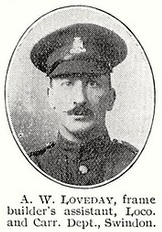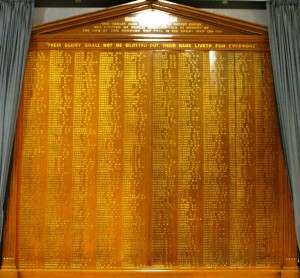Posts Tagged ‘education’
Exploring Swindon’s war – a workshop at Orchid Vale Primary School
I recently spent the day giving a First World War workshop to Year 6 pupils at Orchid Vale Primary School in Swindon. During the morning I spoke about my job and the variety of roles I perform. After that brief introduction I spoke at length about the wartime life of a typical British soldier, kit, food and the daily routine of trench warfare. Having brought along some German barbed wire found last year when walking on the Somme, I was able to show them the length of the barbs.
“We had a fabulous day on the Friday you came in. Without a doubt, the children found your visit inspirational – so much so that many now want to be historians! You helped bring to life some of the things they had started to read about and helped to give them an understanding of concepts that are hard for children in Britain today to imagine, in a way that was engaging.” Fran Randall, Year 6 teacher, Orchid Vale Primary School
We then spent some time talking about local Swindon men who went off to war. Having used Mark Sutton’s excellent ‘Tell Them Of Us’ book all about Swindon’s war dead, I had identified a number of characters that I knew would interest the children.
One of these men was Second Lieutenant Frederick Wheatcroft, a Swindon town footballer who was killed at Bourlon Wood during the Battle of Cambrai in November 1917. Another was a former GWR employee, Arthur William Loveday who had won the first of his two Distinguished Conduct Medals in a daring raid on the German trenches at Ploegsteert Wood in December 1915. We also looked at Swindon men who had gone to Canada before war started as so fought in the Candian Army.
The afternoon was spent visiting Swindon’s main war memorial. On arriving at the Cenotaph at Regent Place the children all had a good look at the memorial, reading John McCrae’s famous poem ‘In Flanders Fields’. We then headed inside to the former Town Hall, now occupied by a dance studio.
Hidden behind curtains is the hugely tramadol rx purchase impressive wooden war memorial, listing over 900 of Swindon’s men who were killed during the war. The children were very keen to look up the names of the men that we had discussed earlier. They also found names that were familiar to them and we looked up their details in Mark Sutton’s book. Our visit concluded with the singing of wartime songs beefier we headed back to the school.
We all agreed it was a great shame that the memorial was hidden from public view. Fran Randall, the teacher who had invited me to Orchid Vale is Swindon born and bred and yet had no idea about the memorial. Ironically, the memorial was paid for by public subscription but is not available for the public to view. For more information about Swindon in the Great War follow @SwindonGreatWar on Twitter.
I had a wonderful day at Orchid Vale, spent with inquisitive children and friendly staff. I hope their interest in the war continues, in particular their efforts to help the campaign to find a more suitable place for the town’s magnificent war memorial to be displayed.
Below are some extracts from pupil’s thank you letters:
“I have turned over a new leaf in history! It used to be a little bit boring to me, now I love it All thanks to you.”
“Finding out about your job inspired me to become historian myself. You obviously have lots of fun being a historian because you get to do lots of incredible things such as working for the BBC.”
“I used to think history was boring but now have a different perspective on it.”
“My class and I really enjoyed your visit, especially the trip to the memorial showing us who passed away and how special they were. What inspired me was learning about your job and your presentation about the war.”
“Before going on the trip I was not that interested in history, listening to the facts about the First World War and all about your life is inspired me to learn more. I found it fascinating to learn all about how people lived in the past.”
“Your visit I believe, pulled a history trigger in all of us and I’ve noticed that history seems more interesting when you know about it.”
 In early November I spent a week working at Shrewsbury International School in Bangkok, Thailand helping explain many aspects of warfare on the Western Front from 1914-1918. In particular, my task was to enhance and deepen students understanding of the war and the impact it had on individual soldiers, society and the implications for the wider world. I was also keen to show the importance of detailed historical study by using examples of my research. One special request was to hear of our archaeological and genealogical work at La Boisselle as an example of specific, detailed research. During a fascinating week I spoke to 800 students from the Year 6 Juniors through to A Level students in Years 11 and 12 (KS2 – KS6).
In early November I spent a week working at Shrewsbury International School in Bangkok, Thailand helping explain many aspects of warfare on the Western Front from 1914-1918. In particular, my task was to enhance and deepen students understanding of the war and the impact it had on individual soldiers, society and the implications for the wider world. I was also keen to show the importance of detailed historical study by using examples of my research. One special request was to hear of our archaeological and genealogical work at La Boisselle as an example of specific, detailed research. During a fascinating week I spoke to 800 students from the Year 6 Juniors through to A Level students in Years 11 and 12 (KS2 – KS6).
The majority of my time was spent working with students and staff in the History Department. Subjects ranged from my role as a historian through to elaborating on some of the archaeological projects I have been involved with over the past few years. A recurrent topic was our archaeological project at La Boisselle. However, my main task was to provide a basic understanding of a ‘typical’ British soldier on the Western Front. Beginning with the enlistment process I was able to provide details on uniform and kit and training in the UK before deployment to France. From the first experience of going into trenches I elaborated on daily trench routine, food, ration parties, medical arrangements and working parties.
“Our students are still buzzing and I’m hoping we see some of their enthusiasm convert into bigger numbers at AS and IGCSE level.” Stuart Howard, Head of History
Whilst the majority of time was spent working with History students I also spoke with those studying English. The curriculum covers the works of Wilfred Owen and I was asked to put his experiences and poetry into some form of context within the war. I was aided greatly with this by my work over the last year on an upcoming BBC Two television programme ‘Writers of the Somme’ which tells the story of the battle through the experiences and words of the poets and writers who took part.
The highlight of the working week was speaking on the theme of remembrance to 650 students in the Senior School assembly. During my week at Shrewsbury International School I was enormously impressed with the children’s enthusiasm, grasp of the subject and inquisitive nature and desire to find out more.
“We thoroughly enjoyed having you here and would love to plan another visit next year. The students and staff loved your talks and I think what worked so well was that you talked to and with the students, rather than at them. I felt that you pitched it all perfectly.” Kathy Wallace, Head of English
“During the week, Jeremy spoke to over 800 students ranging in age from 11 – 18 years old predominantly about aspects of the First World War needed for their studies. He was able to describe in detail the day to day routines of soldiers and their officers, the brutality of war and its legacy. His detailed knowledge of the topic and individual soldiers stories meant he was able to personalize the experiences of the men and their families. Jeremy also spoke in detail about the ongoing project at La Boisselle which was fascinating and incredibly moving.
His visit coincided with Remembrance Day and Jeremy took a Senior School assembly (650 students) focusing on 3 individual stories encapsulating the war. Students and staff were captivated as he shared the stories of a 16-year old boy soldier, 98-year old Lily Barron, whose father was killed on the Western Front when she was 5 years old and Hugh Dennis’s grandfather (BBC ‘Who Do You Think You Are?’)
Many of our students thought a First World War military historian would be old and boring. Jeremy certainly rapidly dispelled this idea by describing how he had worked in a number of jobs before following his passion of military history, how he researches for television companies and for families from all over the world with relatives that served in the war.
The interest created amongst staff and students alike was astonishing and testament to Jeremy’s deep subject knowledge, sensitive, professional delivery and approachability. His visit helped enthuse a new generation to the importance of history and how valuable and rewarding military research is. Our students undoubtedly gained a huge amount of knowledge and, most importantly, a deeper and more empathetic understanding of the First World War.
We cannot wait for his return in November 2014.” Sally Weston (Assistant Principal) Prep
After a week’s work at the school I spent the weekend based at Kanchanaburi on the Thailand-Burma Railway (Death Railway) visiting the war cemeteries, exploring cuttings in the jungle and looking into tragic events of another war. My ten days away was challenging, exhilarating and deeply moving. My sincere thanks to students and staff for their help with the week. I am already looking forward immensely to my return to Bangkok in the autumn.
I provide a variety of talks and workshops for schools. Please see my dedicated page for further details: https://jeremybanning.co.uk/schools-talks-and-battlefield-visits/.





